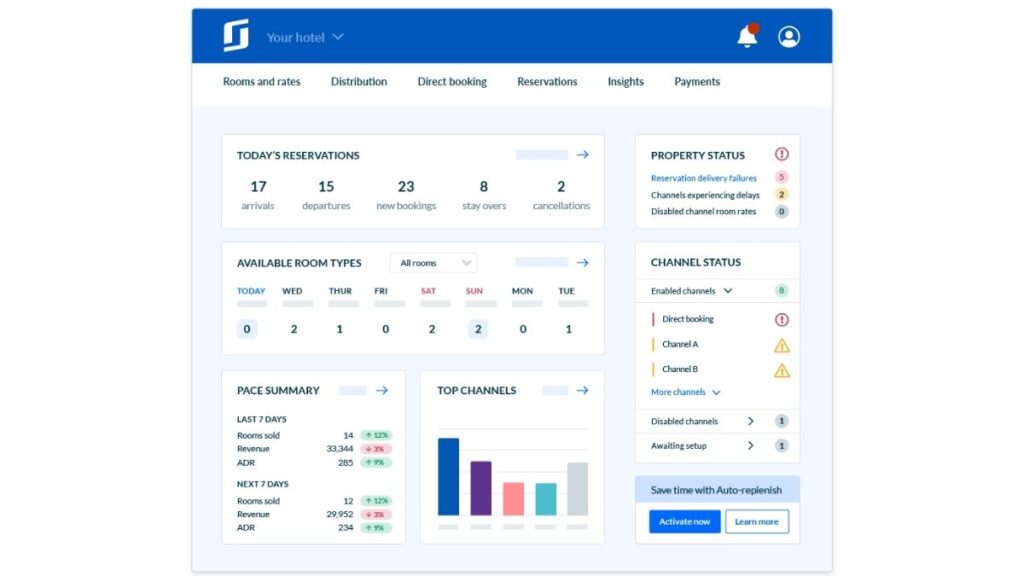The hotel industry has been through the worst of the pandemic. From zero occupancy to changing regulations around safety protocols, many hotel chains faced financial struggles and layoffs were common. With the opening up of travel and a general easing of regulations, is this the return to the good old days?
To find out more, we speak to Dai Williams, who is the Chief Growth Officer at Siteminder, one of the largest hotel commerce platforms in the world. With over 33,000 clients, they have been at the forefront of digitalising hotel management for years.
READ MORE: We speak to David Wong from Deemples about travel and golf
They have just launched their new platform and are looking to rebuild after a trying time during the pandemic. To get a better sense of how the hotel industry can bounce back and the role of technology in its growth, we picked Dai’s brain.
Here’s what he had to share.
How is technology like yours helping hoteliers stay relevant right now?
As the world’s leading open hotel commerce platform, SiteMinder is committed to making simple technology readily available to the world’s one million hotels. It’s no mean feat for hotels to stay relevant in such uncertain times — as people rekindle their love of travel after two difficult years, they are faced with more choices than ever before about what type of experience they want.

The hotel industry has typically been one of the least digitised and most fragmented industries. We still hear stories of hotels running their operations on paper and in spreadsheets. Using SiteMinder’s next-generation platform, hotels can better sell, market, manage and grow their business. It brings together SiteMinder’s complete suite of commerce products, consisting of booking channels, property management systems (PMSs), hotel applications and hotel consultants.
In a time when standing out against the competition has never been more important, having an end-to-end technology suite on your side gives you the best chance of success to increase conversions, enhance guest experiences, and gain real-time insights into customer and market behaviours.
What are some of the trends you are seeing right now for hoteliers around the world?
Travel is in greater demand than ever. But it’s also evolving.
- Offering flexibility is crucial. Although stabilising, uncertainty from the pandemic is still a fact of life. Hoteliers who do not offer flexibility around cancellation or refund policies as an embedded option into their booking systems will find consumers searching for other hotels that do.
Travellers still want flexibility and the freedom to change their plans, and such precautions will likely remain embedded into the decision-making process for years to come. Hotels need to have the right technology in place to do the heavy lifting for them when it comes to keeping pace with customer changes — not just last-minute changes to travel and booking plans but also coping with any macro changes that might suddenly spring up. - Try new ways of marketing. There is increasing popularity of video marketing and virtual reality (VR) for hotels. It gives guests a whole new opportunity when researching travel and exploring the hotels they want to stay with. To this end, hoteliers need quality content to host on these platforms and show off the unique selling points of their property.
- Use Tech to help with staffing issues. One of the biggest concerns for hotels globally is accessing staff for booming travel. Hospitality has been one of the worst-hit industries throughout COVID-19, and many people have left the industry because of all the uncertainty, and this can impact the hotel’s ability to deliver the service they envisage. Hotels will have to embrace technology to bring power in their guest experience – think digital check-in and great direct booking products – where previously they would have relied on people.


Can you share how travellers are evolving as well, based on your data? (what are some of the changes you are seeing according to your data?)
In March 2022, hotel reservation volumes globally were the strongest they’d been since late February 2020. Particularly across the Asia-Pacific region, travellers are proving they are trusting and reactive when it comes to changing regulations.
Something that was especially interesting was that 56% of hotel bookings globally made in mid-February were either for February or March stays — highlighting that the majority of guests are still precautious about making long term plans. Those in the Asia Pacific were booking particularly last-minute, with a quarter of bookings in the region made in mid-February for stays in February.
This points to a short-term but important trend of spontaneity amongst travellers, who want to be absolutely certain about whether or not there are travel restrictions in place, and that there are no COVID-19 symptoms present for themselves or their families before travelling.
In Australia, we are seeing the makeup of domestic and international bookings returning to pre-pandemic levels. In March 2020, international bookings made up 16.7% of all hotel bookings in Australia. This then abruptly dropped and did not rise above 6% until February 2022, with international travel restrictions driving spikes in domestic bookings across Australia instead. In April 2022, international bookings climbed steadily to 9.28%.
READ MORE: Alex Tan from TrustYou discusses “Relationship Innovation”
What do you think is next for hoteliers in the coming 12-24 months?
SiteMinder’s Dynamic Traveller report recently found that 52% of global travellers now have higher expectations when it comes to accommodation standards, with special focus given to convenience, personalisation, and experience. Hoteliers are now facing a new type of traveller: one who is savvy enough to track down the best deals and booking experiences and carefully research all available options.
They are rarely willing to hand out second chances for sub-optimal experiences, and — crucially — having just spent two years hardly travelling or not at all, are searching for that unique, memorable, and easy travel experience for themselves and their families.
Over the next two years, designing and redefining what makes your hotel unique and memorable will be key to standing out in a sea of competitors keen to welcome the travel-hungry guest. But layered on top of that has to be the technology to power the customer experience.
Whether you’re a small independent hotel or a large branded property, being a leader in hotel commerce is about delivering products and services to guests that offer convenience, personalisation, and value at speed. Without it, hoteliers will face ongoing limitations to how they sell and market their properties and lack control over operations, data, and resources.
What’s next for Siteminder?
The recent launch of SiteMinder’s next-generation platform represents the omnifying of hotel technology. By bringing siloed products together, it enables the global hotel industry to capitalise on entire platforms and ecosystems coming together. It’s been the conduit to our purpose as an organisation: to open up every hotel’s access to the world of online commerce. The newest generation of the SiteMinder platform is just the beginning.

